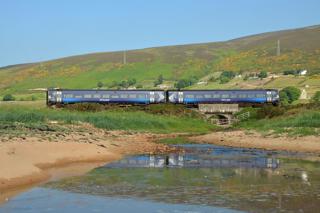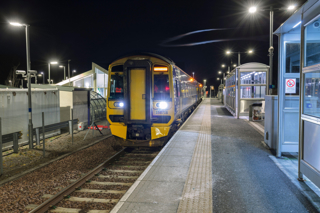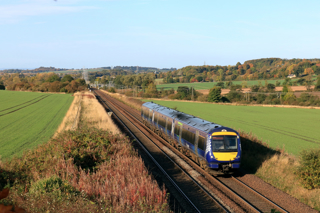With nationalisation legislation in place, but Great British Railways still several years away from managing train operations, Philip Haigh explains why the government has to fully engage with today’s railway.
She moved fast. And was gone. Louise Haigh’s tenure as Transport Secretary came to an abrupt end in the early morning of November 29, as she quit over a spent conviction for fraud over a lost-then-found mobile phone over a decade ago.
With nationalisation legislation in place, but Great British Railways still several years away from managing train operations, Philip Haigh explains why the government has to fully engage with today’s railway.
She moved fast. And was gone. Louise Haigh’s tenure as Transport Secretary came to an abrupt end in the early morning of November 29, as she quit over a spent conviction for fraud over a lost-then-found mobile phone over a decade ago.
The previous day, she’d been speaking at a set-piece event in Leeds to launch the Department for Transport’s integrated transport strategy that she said would be published next year.
Her speech was more than a nod to Barbara Castle, the Labour transport minister in the 1960s who created local transport integration by way of Passenger Transport Executives (RAIL 1019), which co-ordinated buses and trains, unified fares and created consistent brands.
Haigh said of Castle’s 1968 Transport Act: “At its core [it] was never a battle of car against train, or bus against tram, but a vision of a coherent transport network that gave people real choice.
“A system in local hands, run by local leaders, and which met the needs of local people. And a system that, in her words, was integral to all other planning - economy, housing, environment. You name it, transport enabled it.”
She also said: “This Government is not interested in hoarding power in Whitehall. I no more want to be running an entire railway than I want a train set in my attic.”
Her speech came a day after her Parliamentary bill to nationalise train operators received Royal Assent as the Passenger Railway Services (Public Ownership) Act. This means that the private train operators that already work under tight DfT contracts now sit a single step from outright ownership by government.
Haigh’s successor, Heidi Alexander, has a tight line to tread. The railway’s problems are her problems.
This is something I don’t think Haigh ever quite understood. In her Leeds speech, she said “there’s a bit of truth” to the view that transport was “quite often a series of bin fires being valiantly tackled by a gang of hobbyists who really, really love trains”.
She added: “And that’s OK because we need people who really love and understand trains.”
Despite this caveat, I saw several reactions that interpreted this as a slight on the professionalism of railway staff across the country. I thought it more an insult towards the railway experts within the DfT, but either way, it was a strange thing to say.
It strengthens my feeling that Haigh never managed the transition from opposition into government.
That to govern is to decide rather than criticise.
That the private train operating companies (TOCs) she has attacked are staffed by the people she needed to work with to build the better railway she wanted.
And that generally the people in those companies do know what’s best for the railway and its passengers. But they found her door closed and became frustrated with her refusal to engage with them.
Merely changing ownership is not enough.
Northern shows this in spades. It’s been nationalised since 2020, but remains riddled with problems - not least around Sunday working in north-west England where the company continues to rely on volunteers to deliver its timetable.
With conductors in the RMT union rejecting Northern’s latest overtime offer (which the company says would have seen them double the money they get for Sundays), passengers face a reduced timetable from December 22.
Despite this, Northern continues to claim that with 1,400 conductors (and 2,000 drivers), it has more traincrew than ever before and enough to run its timetable. Yet it clearly can’t.
It’s not alone in struggling to convince staff to work overtime. For example, Great Western Railway has also been warning passengers to check before they travel amid uncertainty around crewing.
So, while Haigh had settled the damaging pay dispute with trade unions and their members, she had yet to get to grips with wider problems around terms and conditions, which she said earlier in November were “not fit to deliver a modern and efficient railway”.
Some of these crewing problems stem from the pay deals. Back pay due to staff has been landing in pay packets through autumn, temporarily inflating them and reducing any need to work overtime. But beneath this remains the structural problem of relying on overtime to deliver rail’s core product.
It’s one of the ironies of recent years that the recent pay disputes would have been far less likely with private train operators working under franchise agreements. They’d often shown themselves more willing to take a risk in paying staff more in order to keep passengers coming than the DfT (and behind it the Treasury) has shown.
There’s another factor at play. Private TOCs were small enough to create a clear link between passengers and pay. Success was infectious. Can the same be said of companies that today are forced to actively discourage people from buying their product? Where’s the incentive to go that extra mile when pay is decided in government offices in London by people staff have never met?
For the 30 years of privatisation, ministers have been sheltered from the calculations made by private operators as necessary to keep passengers coming back. To a great extent, trade unions have also been sheltered by privatisation, perhaps forgetting what centralised pay deals can mean.
As one manager put it to me: “The unions want nationalisation with a private wage.”
Heidi Alexander now faces the challenge of how to buy 21st century terms and conditions across railway companies. She faces a railway in which staff no longer want or need overtime. This suggests that rail companies will require higher base establishments and hence must recruit more staff.
Will the DfT and Treasury take this risk? Will they pay upfront to deliver the consistent product needed to grow passenger numbers? And will unions accept that higher overall numbers, which drive a higher wage bill, might result in tighter annual pay awards?
Haigh may not have wanted to run a railway, but Alexander inherits a department that is set to take even tighter control of the companies that do run the railway. This demands a DfT (or its subsidiary DfT OLR Holdings) that’s fit to absorb newly nationalised operators.
Great British Railways may be the longer-term answer, but it’s several years away from taking on the task of managing train operations with infrastructure work. This means making the DfT match fit for this task. That must be a DfT that is prepared to consider plans from operators and take decisions on them. A DfT that needs to convince the Treasury to take a risk on rail if rail is to keep growing.
If Alexander is to keep Haigh’s drive towards local control - not hoarding power in Whitehall - there’s plenty to do to work out how.
Haigh put forward Dijon as an example. This French town is about the size of Chester and has an integrated network of trams and buses run by Keolis (a private company, although majority-owned by French state railways, SNCF).
This example sits poorly with rail networks that run beyond town or city boundaries, which is why Barbara Castle’s PTEs were regional organisations. That points to one of the challenges for increased local control of rail services.
Except there is a local control option already in place. Britain’s train operators are split into localised companies. They’re headed by teams with links into local councils and other stakeholders.
So, Alexander would do well to start trusting those local companies with local managers to develop and deliver the railways’ next phase, which must be one of growth.
Because there is another option. It’s the one Northern is taking to cut timetables to fit its traincrew. It appears a valid choice and one that could well appeal to a Treasury concerned only with costs.
I fear it’s a fool’s choice. So much of the railway’s costs are fixed that the only way to create space between costs and income is to grow income. In reality, that means growing passenger numbers because there’s little appetite among today’s or tomorrow’s passengers to see fares increase.
To cut back now, to decide not to recruit, will make future problems worse. It will make the railway more vulnerable to the effects of an ageing workforce deciding to take their pensions, perhaps even earlier than they might have done.
Government has its nationalisation legislation in place. Now is the time to move on from politics and concentrate on delivering a railway that’s fit for tomorrow. That will only be done by engaging properly with today’s railway today.
Login to continue reading
Or register with RAIL to keep up-to-date with the latest news, insight and opinion.




















Login to comment
Comments
No comments have been made yet.